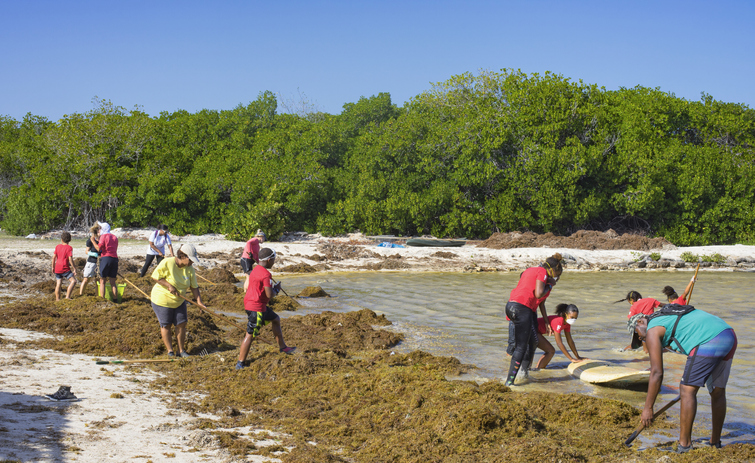Tourists to the Caribbean may not realize that a brown drifting seaweed that’s been piling up on beaches in recent years is dangerous, researchers say.
Travelers and doctors alike should be aware that prolonged contact with the Sargassum weed, or inhaling the hydrogen sulfide gas it gives off as it decomposes on the beach, can cause heart palpitations, shortness of breath, dizziness, vertigo, headache and skin rashes, the authors write in the Journal of Travel Medicine.
“I’ve observed patients returning from affected areas with unusual symptoms that were reminiscent of an intoxication syndrome in the absence of alternate explanations,” said co-author Dr. Andrea Boggild, clinical director of the Tropical Disease Unit at Toronto General Hospital.
“The more research I did on the topic, the more I realized that this really is an issue that continues to fly under the radar of most medical professionals,” she told Reuters Health by email.
Boggild and co-author Dr. Mary Elizabeth Wilson of the Harvard T.H. Chan School of Public Health in Boston report that beginning in 2011, larger-than-normal rafts of the brown seaweed began washing up on shores around the Caribbean, originating from the northeast coast of Brazil, and by 2018, record amounts were reported. The seaweed also occurs in China’s Yellow Sea, where it’s known as “golden tide.”
Decomposing Sargassum releases hydrogen sulfide gas and ammonia, which can cause respiratory, skin and neurocognitive symptoms in both local residents and tourists. Toxic exposure typically happens during decomposition, which is about 48 hours after it washes ashore. On the islands of Guadeloupe and Martinique alone, more than 11,000 cases of acute Sargassum toxicity were reported during an eight-month period in 2018.
“If the rafts of Sargassum continue, and there is no expectation that they will not, it is likely that medical practitioners will increasingly encounter returning travelers with a range of associated symptoms,” Wilson said.
No specific treatment for Sargassum toxicity exists, although supportive medical care can help. Doctors typically have to diagnose the source of symptoms by ruling out other possibilities. It would be better for travelers to avoid exposure to the seaweed in the first place and to be careful about tour operators or hotels that may not be transparent about the severity of the rafts in the area, the authors write.
“Travelers should consult local news media and search for information about Sargassum in their intended destination,” Boggild said.
Some websites and social media accounts have “Sargassum watches” but these aren’t always accurate, she added, so local news and government advisories may be the best sources for up-to-date information. After returning home, travelers should seek medical care if any symptoms occur, Boggild said.
With Sargassum accumulating along the coasts of Florida, the Gulf of Mexico and the lesser Antilles during the past year, collaborations have begun among oceanographers, ecologists, marine biologists and public health agencies to understand the causes, health effects and prevention strategies, the authors write.
“Physical removal from beaches or fishing community bays will only provide temporary respite – until the next arrival,” said Dr. Dabor Resiere of the University Hospital of Martinique in Fort-de-France, who has studied the Sargassum invasion in the Caribbean.
“This is not just a Caribbean problem – there is an international dimension,” he told Reuters Health by email. “We need the world to step in to highlight the scale of the problem, and to attract the attention of the international scientific community, as well as those who could assist in the logistical handling of the weed.”
At the same time, travelers shouldn’t have to change their travel plans. Resorts and other beachside companies regularly hire cleanup crews, install offshore barriers to limit the seaweed washing ashore, and send boats into the ocean to remove the algae.
“While mass blooms have been forecast for this year, they are less expansive than last year, and I would not cancel my holidays,” said Colette Wabnitz of the University of British Columbia Institute for the Oceans and Fisheries in Vancouver, Canada.
“There is no need to panic,” she said by email. “Use common sense and make sure to heed local travel and health advisories.”






